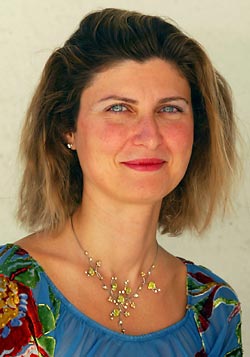UC Berkeley Press Release
History professor Maria Mavroudi receives MacArthur fellowship
BERKELEY – Maria Mavroudi, a University of California, Berkeley, assistant professor of history and an expert on Greek and Arabic cultural interaction in the Middle Ages, has been awarded a MacArthur "genius" fellowship.
 Maria Mavroudi (Photo courtesy MacArthur Foundation) |
Mavroudi is among 23 recipients across the country receiving the prestigious award, which provides fellows with $500,000 over a five-year period.
The John D. and Catherine T. MacArthur Foundation announced the winners today (Tuesday, Sept. 28). An anonymous committee nominates and selects fellows based on their exceptional creativity and promise. There are no restrictions on how the award is used.
Mavroudi has not yet decided exactly how she will use the money, though she is certain it will be used to aid her research. For the time being, she is simply processing the fact that she won.
When the professor received a call from a MacArthur foundation
representative, "I thought that maybe he wanted my opinion on someone else," Mavroudi said. "I
just couldn't believe he would be calling to announce I was a winner.
I just couldn't believe it. To this day I can't believe it."
Martin Jay, chair of UC Berkeley's history department, which is part of the College of Letters & Science, was also thrilled by the news.
"In a very short time, Maria Mavroudi has established herself as a path-breaking, internationally acclaimed scholar in the history of Byzantine-Arabic cultural relations in the l0th century, as well as a brilliant philologist and translator of earlier texts from the ancient world.
"Commanding all the relevant languages - modern and Ancient Greek, Arabic, Latin, Coptic, and Syriac - as well as a deep knowledge of the history of medieval science, she has been able to demonstrate the crucial role of Arabic culture in stimulating Byzantine intellectual development. The implications of her work for the more general issue of cultural contact between the great civilizations of the world are profound."
Mavroudi, 37, said her research interests date back to her days as a youth growing up in Greece. She took the standard history courses, but wondered why they focused on the fifth and fourth centuries B.C., the period of classical antiquity, and largely ignored the Byzantine period, the fourth through 15th centuries.
"That got me wondering why we are so enamored with a couple of centuries and pay disproportionately little attention to a whole millennium," said Mavroudi. "Compared with other periods of Greek history, Byzantium (the medieval Greek empire) is generally understood as representing an era of decline and therefore of secondary significance; yet, it has to be important for world history, if not for any other reason, at least because for a while it was a world empire and a political and military super power. The prestige of its culture radiated throughout the Mediterranean and beyond."
As a college student, Mavroudi began to explore this era. In the course of her doctoral research, she became aware of an intricate web of cultural exchange among the medieval Greek, Latin and Arabic cultures. The influences ranged from the sharing of scientific knowledge to architectural design to the creation of luxury objects, including the production of glass and alabaster vessels and silk textiles.
The professor believes that the study of the medieval Greek empire and its interaction with the Islamic world has been neglected both internationally and in Greece because of modern politics and Greece's position since 1979 as a member of the European Union. She contends that there is always an interest among nations and empires to seek association with a current power, and today that lies in the West, not the Middle East.
But her research shows that empires create a permeability from culture to culture, and that cultural traditions persist even after the end of the political entities in which they flourished.
"It is a lesson from history that gives one hope," she said.
Mavroudi received a bachelor's degree in classics from the University of Thessaloniki, Greece, and from Harvard University a master's degree in Byzantine literature and a doctorate in Byzantine studies.
She is the author of "A Byzantine Book on Dream Interpretation: The Oneirocriticon of Achmet and its Arabic Sources" (2002). Mavroudi was a fellow at Dumbarton Oaks, Harvard's Byzantine research library in Washington, D.C., and a Hanna Seeger Davis Post-doctoral Teaching Fellow in Hellenic Studies at Princeton University before joining the UC Berkeley faculty in 2002.
Mavroudi suspects that the award will pay off not only financially but also in terms of its prestige. She hopes the honor will convince UC Berkeley officials to expand the University's library collections in Byzantine studies.

